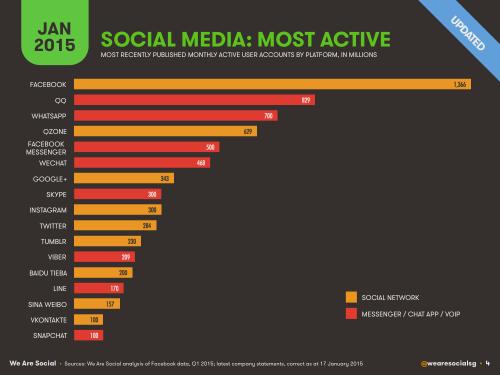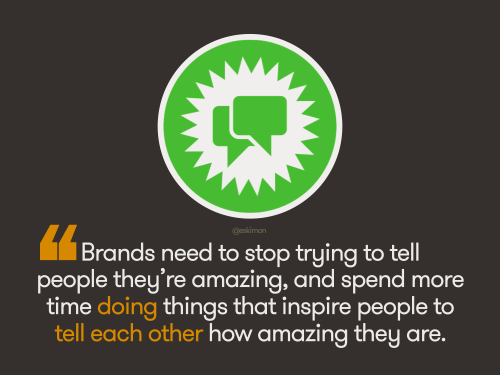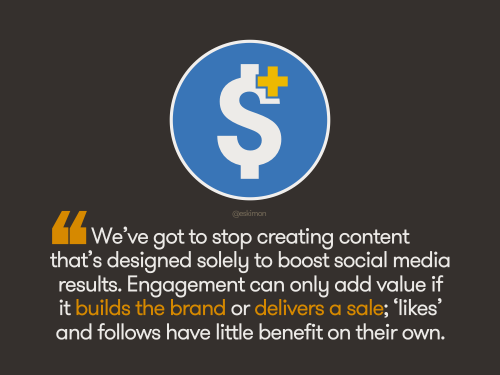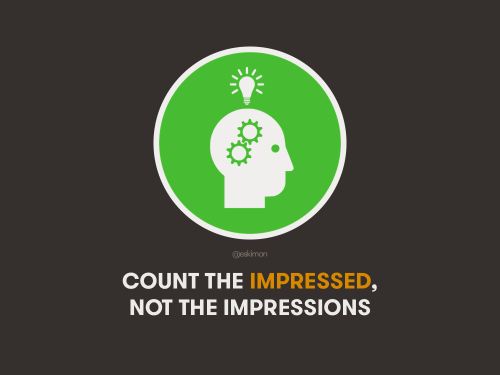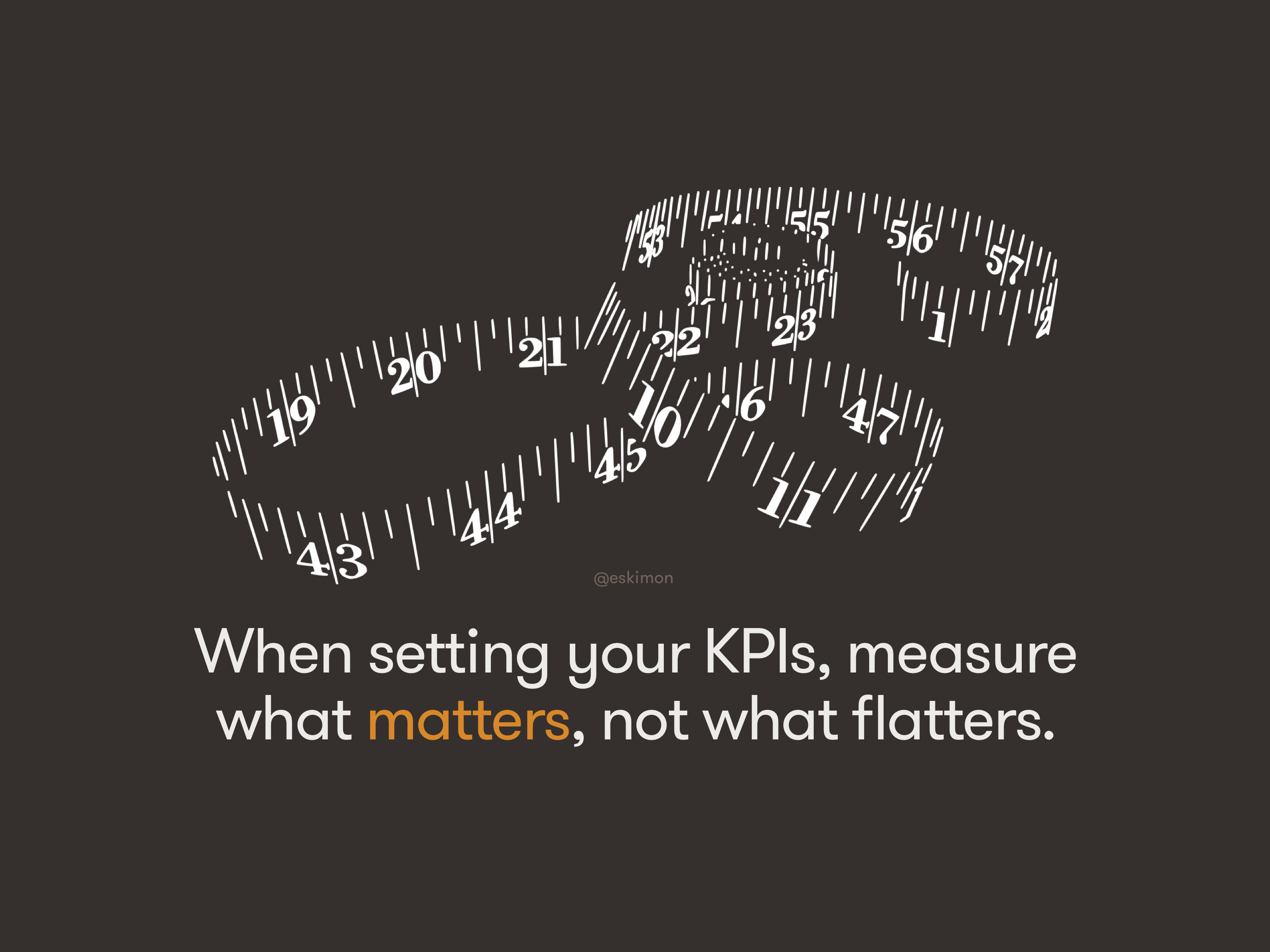The ‘New Social’: How Brands Must Change
I joined Rishaad Salamat on Bloomberg TV this morning to discuss how brands need to change the way they approach social media in light of the changes we highlighted in our new Digital, Social & Mobile in 2015 report.
As you’ll see from the video of our chat above, the most valuable findings to come out of this report are not the staggering numbers, nor the impressive growth of all things digital; much as these things are important, it’s the change in the ways that people are using digital connectivity, and why they’re using it, that has the greatest significance for marketers.
If brands are to make best use of the huge opportunities in social, they’re going to need to make a few changes of their own.
1. Mobile Is More Organic
The biggest shift highlighted in this year’s report was the increasing adoption of mobile social – in particular the rapid adoption of chat apps like WhatsApp, WeChat and Facebook Messenger, all of which are growing at averages of more than 25 million active users per month.
But that has some serious implications for brands:
- Very few people choose to interact directly with brands on social media. Instead, almost all of their chat-app activity involves direct, real-time conversation with friends. They may well be talking about brands, of course, but marketers can’t see this activity, nor can they measure it.
- If people are sharing branded content, those shares are all organic. They’ve actively chosen to take the content or the link, move to a new app, and then share it. For this to happen, there needs to be a clear, personal benefit to doing so. The traditional ‘share this with your friends for a chance to win’ tactics aren’t going to work either, because there’s no way for brands to track that behaviour.
- Because of this, we’re going to need to adopt a content approach that’s more about inspiring active, peer-to-peer conversation than it is about stimulating the social media head-nodding of likes and RTs.
Key tip: make marketing worth talking about, rather than talking about yourself
2. It’s Time To Grow Up
Too many marketers believe the world revolves around their brands. However, just as toddlers learn to realise that they’re not the centre of the universe, and that they need to exist in social harmony with other people, so marketers need to accept that people aren’t living their lives waiting for the next advert or innovation from their brands.
It’s time marketers learnt the key social skills of empathy, consideration and generosity, otherwise we’re going to continue being that kid who turns up to a friend’s birthday party and expects to be the centre of attention
Key tip: it’s not about you.
3. Think Longer-Term
Most brands still approach social media thinking they’re channels to deliver immediate sales. However, this is a mistake – for two important reasons.
Firstly, people’s primary motivations for using social media aren’t related to learning about a shampoo’s ingredients, or hearing about a credit card’s 1% cash-back offer. People use social media for their own interests – principally to interact with the people they care about, and to tell their own stories. For the most part, they don’t care about brands unless those brands help them with their own, personal objectives. As a result, brands’ social media activities need to be built wholly around their audience’s motivations, rather than obsessing about their own selfish desires to ‘increase likes’ or drive this month’s sales.
This last point brings us to the second, critical part of the mistake, though: many communications channels are well suited to driving those short-term sales conversions, but no other channel offers the opportunities to interact with people on a one-to-one basis, at scale and over time, that social media do. As a result, marketers would do better to use all those other channels for short-term uplift activities, and focus their social media activities on building longer-term equity and increasing lifetime value.
Key tip: stop getting stuck in ‘one night stand’ marketing, and build longer-term, mutual value instead.
4. Don’t Let Numbers Fool You
Almost every marketer I speak to talks about ‘increasing social media engagement’, but none of them defines it in the same way. What’s more worrying, though, is that many of us are still measuring ‘engagement’ in terms of likes, shares, comments and the like.
However, these metrics are all too easy to game, and this has resulted in a plethora of thoroughly misguided marketing on platforms like Facebook, where marketers and their agencies have focused on those activities that deliver immediate, platform specific results, instead of more meaningful, brand-oriented change.
That’s the reason why so many brand’s Facebook pages focus on quizzes, competitions, and questions. However, far too many of these posts are designed to maximise results, presumably so that the marketers and agencies involved can tell a ‘good story’ to their colleagues in other departments.
But we’re only fooling ourselves. This sort of behaviour is akin to asking our partners to tell us that they love us; while they’ll almost always respond in the affirmative, such behaviour does very little to strengthen bonds or help us achieve the outcomes we really desire.
Let’s be absolutely clear about this: there is no point in managing a social media presence for your brand unless it adds real brand value.
We must, must, must move on from our industry’s obsession with increasing knee-jerk response metrics such as likes and comments, and instead focus on the activities that are actually going to make a difference – to us and to our audience’s lives.
If you can’t explain in a single sentence how your social media activities are improving your brand’s bottom line – rather than that of the social platforms you’re buying advertising from – then it’s imperative that you rethink your brand’s approach to social.
Key tip: measure what matters, not what flatters.
5. Be Sociable
The final point is surely the most obvious, but for some reason, it remains the most overlooked. The secret to success in social media lies in its name: we need to be social.
True friendship isn’t built by throwing lavish parties or creating amazing content, much as that might be the way we first get acquainted. It’s certainly not built through attempts to mitigate our own insecurities by asking other people to tell us they love us, either (i.e. ‘click like if…!‘)
Rather, friendship is built through being a friend: by showing we care about the other person, by talking about the things that we share a common interest in, and by being there for them in the bad times as well as the good.
The brands that will succeed in tomorrow’s longer term are those brands who treat their audiences and consumers as equals, not simply as pawns in their selfish quest for world domination.
Top tip: behave like a true friend, and people are more likely to see you as one
